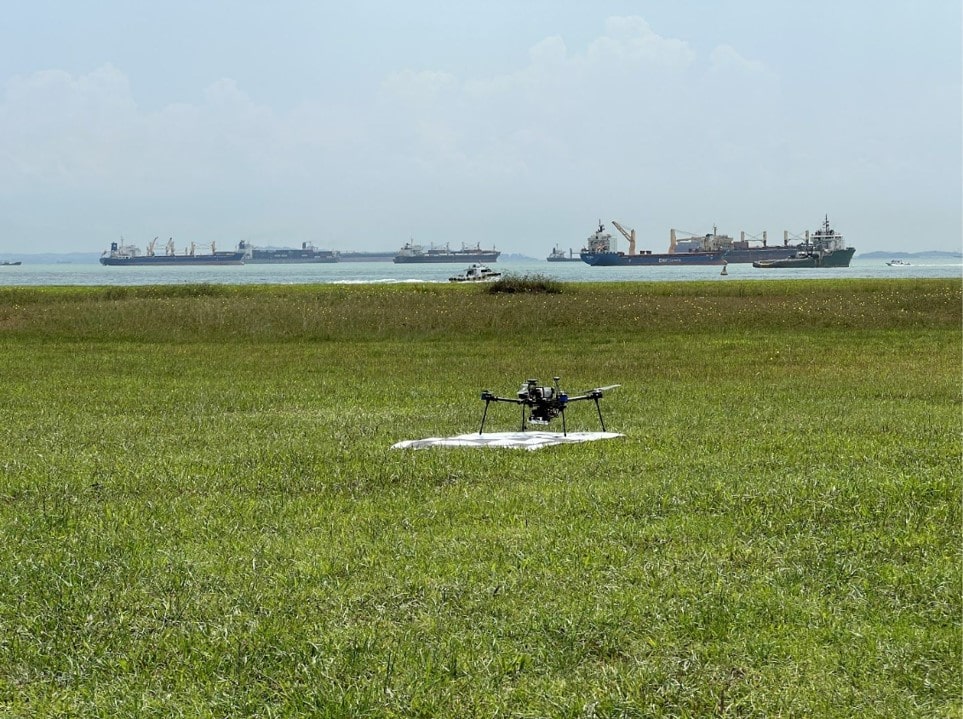 Wonder Robotics’ drone can take off and land without human supervision. (Photo: HTX)
Wonder Robotics’ drone can take off and land without human supervision. (Photo: HTX)
Drones that can attach sensors to walls, and others that can take off and land without human supervision. AI-facilitated X-ray detection at checkpoints that can spot hidden explosives and bomb components. Computer-aided navigation and mapping in areas without GPS coverage. Scanners that can spot people trying to sneak in dangerous items like ceramic knives. These are public safety solutions developed by global startups for the Home Team which were recently showcased at HTX innovation hub Hatch’s inaugural Demo Day.
Flyz Robotics’ drone
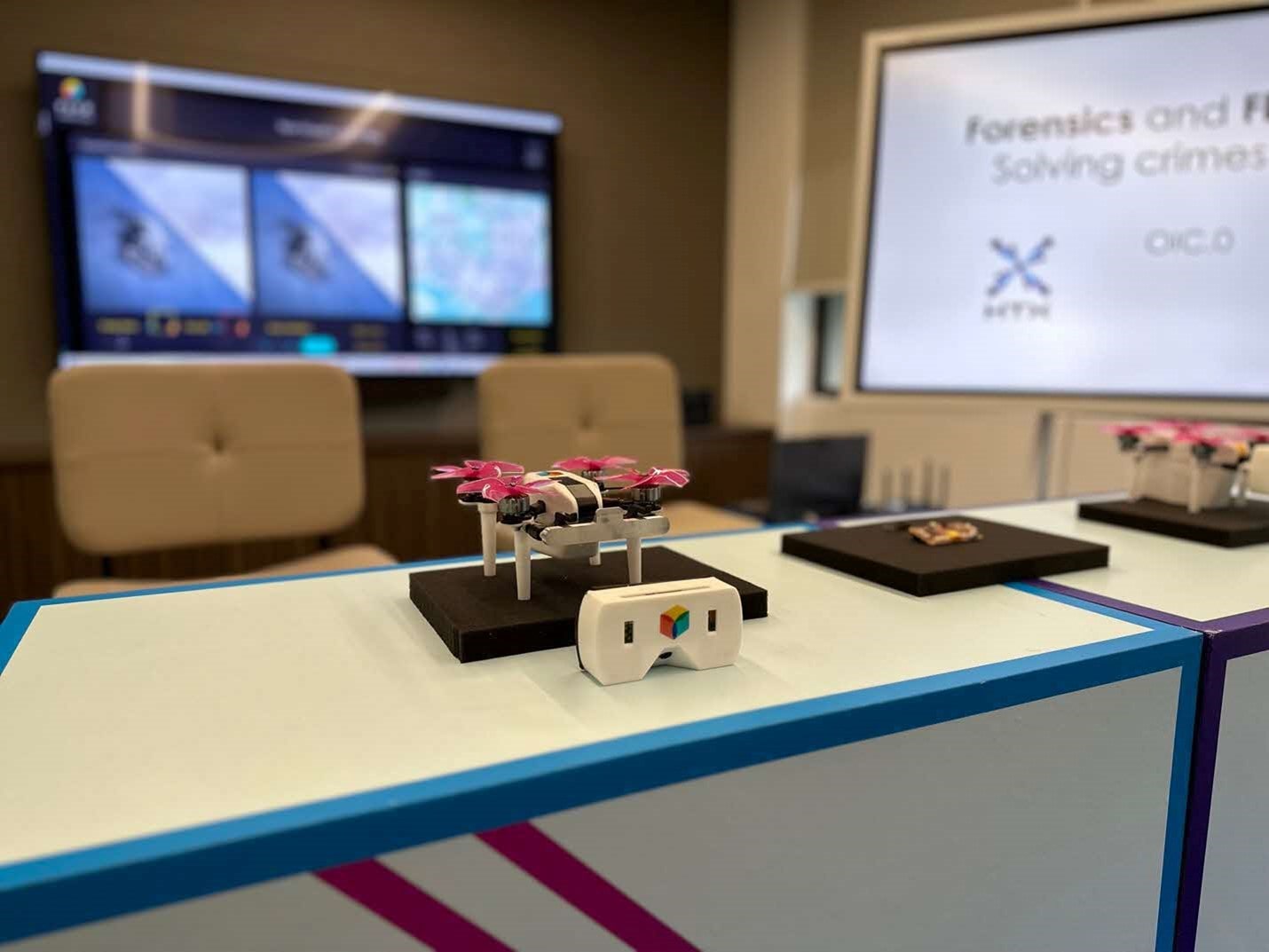 Flyz Robotics’ drone can rapidly attach sensors on vertical surfaces to harness information on a scene, glean actionable insights, and enhance decision-making. (Photo: HTX)
Flyz Robotics’ drone can rapidly attach sensors on vertical surfaces to harness information on a scene, glean actionable insights, and enhance decision-making. (Photo: HTX)
Justin Tan, Senior Forensic Scientist (Forensic Physics and Engineering) at Forensics Centre of Expertise (CoE) applauded his journey with Hatch and the startup Flyz Robotics: “Hatch’s Open Innovation Challenge proved to be an instrumental avenue for engaging and collaborating with innovative startups from across the globe, in an accelerated manner. We were able to co-develop a prototype to deploy a suite of sensors within high-risk scenes, at speed. These sensors allow us to obtain a forensic-centric situational picture and capture transient evidence, which is particularly important for scenes where forensic officers cannot immediately gain access to, such as a post-blast scene. This paves the way for more efficient forensic scene processing and reconstruction.”
Neural Guard’s AI-facilitated X-ray detector
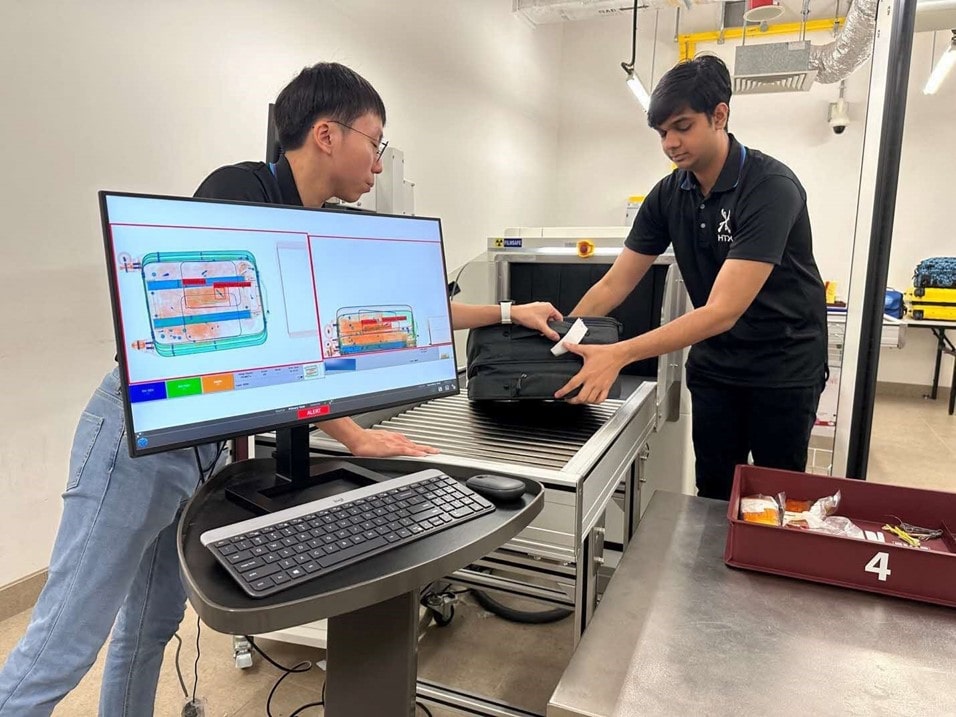 Neural Guard’s AI-facilitated X-ray detection prototype aims to minimise the risk of hidden explosives or tiny bomb components getting overlooked during the baggage screening process at our checkpoints. (Photo: HTX)
Neural Guard’s AI-facilitated X-ray detection prototype aims to minimise the risk of hidden explosives or tiny bomb components getting overlooked during the baggage screening process at our checkpoints. (Photo: HTX)
“Neural Guard is a startup which is highly driven to achieve its desired goals. It has impressed me with its ability to complete a proof-of-concept with success, within months,” shared Dr Goh Ho Wee, Deputy Director (Threat Scanning & Analytics) at Chemical, Biological, Radiological, Nuclear, and Explosives (CBRNE) CoE, “Its latest capability to detect detonators and explosives from X-ray images could greatly enhance the chances of detecting improvised explosive devices at various airport gate-hold rooms and border checkpoints, thereby greatly and positively impacting Singapore’s safety and security. This could not have come more timely in a period of raising geopolitical tensions and when we need to step up our vigilance against terror attacks.”
Vayyar’s non-invasive walk-through scanner
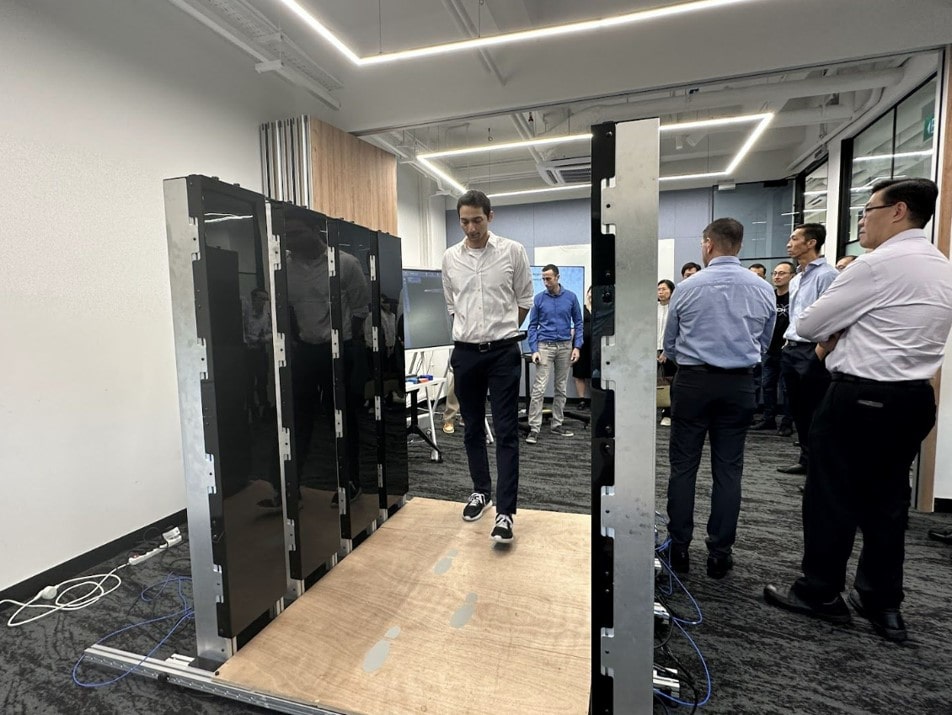 Vayyar’s prototype non-invasive walk-through scanner can detect the presence of hidden metal or non-metal objects on any part of the body, without requiring the person to go through a full-body security check. (Photo: HTX)
Vayyar’s prototype non-invasive walk-through scanner can detect the presence of hidden metal or non-metal objects on any part of the body, without requiring the person to go through a full-body security check. (Photo: HTX)
Ng Jiunn Shyong, Head (Protective Security Technology) at Protective Security and Safety CoE, noted the following about the prototype from the startup Vayyar: “Existing screening process is manpower intensive and its pain points were studied. The prototype non-invasive walk-through scanner has proven to be feasible, scalable to detect more objects of interest and deployable for more security applications.”
Wonder Robotics’ drone
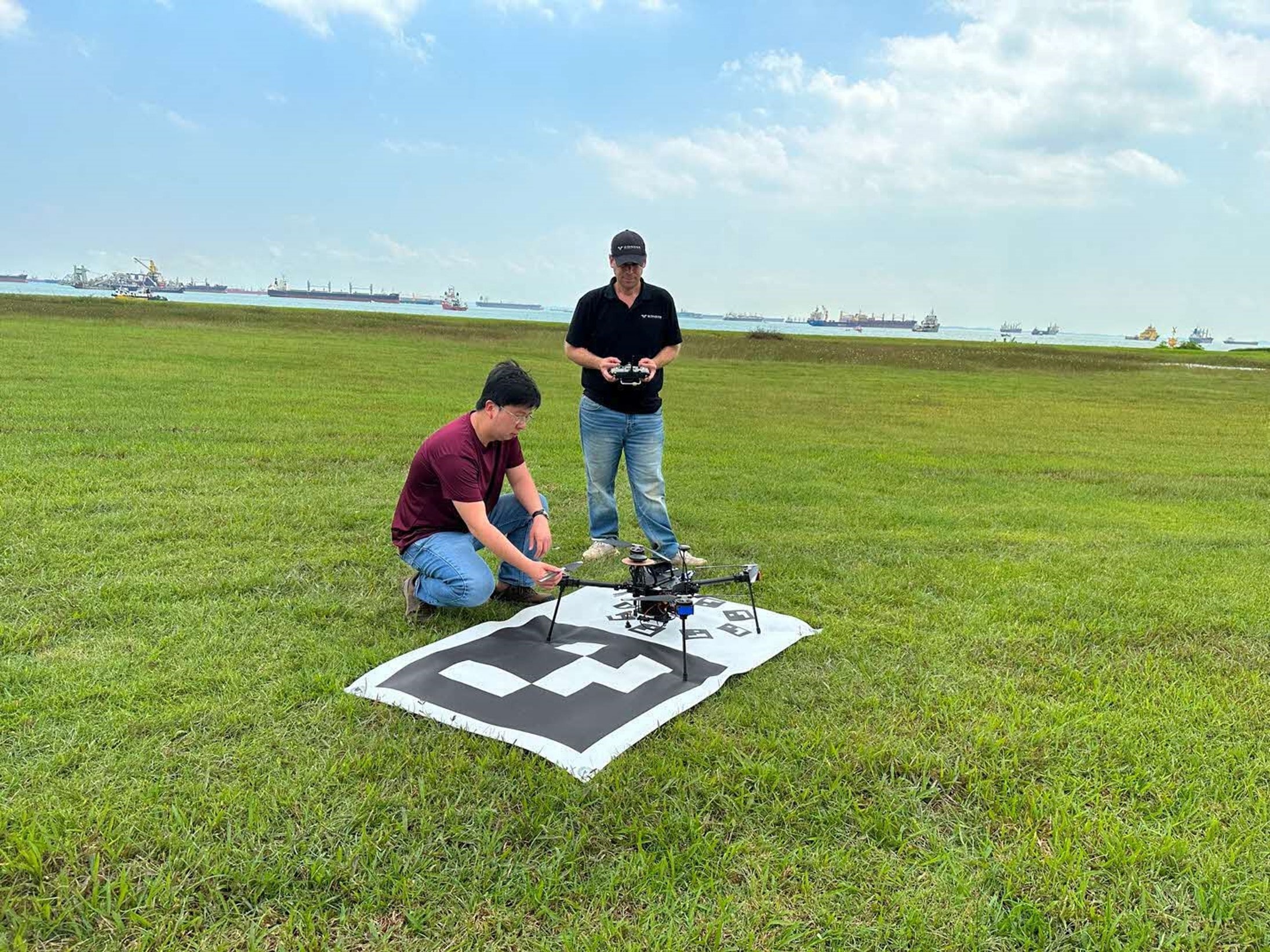 Wonder Robotics’ prototype drone can take off and land autonomously, does not require the use of any global navigation satellite system (GNSS), and can fly in uncharted, unprepared, and unattended sites. (Photo: HTX)
Wonder Robotics’ prototype drone can take off and land autonomously, does not require the use of any global navigation satellite system (GNSS), and can fly in uncharted, unprepared, and unattended sites. (Photo: HTX)
“The new suite of features and functions that Wonder Robotics have developed with us is a key technology piece we’ve been eyeing for long to fit into our range of drone capabilities,” observed Low Hsien Meng, Lead Engineer (Aerial Systems) from the Robotics, Automation & Unmanned Systems CoE: “Working directly with startups like them directly gives us the flexibility in the technical approach to solve our challenge statements. I’m excited to see the solutions being implemented eventually.”
Cyberbee’s compact and cost-effective computer vision
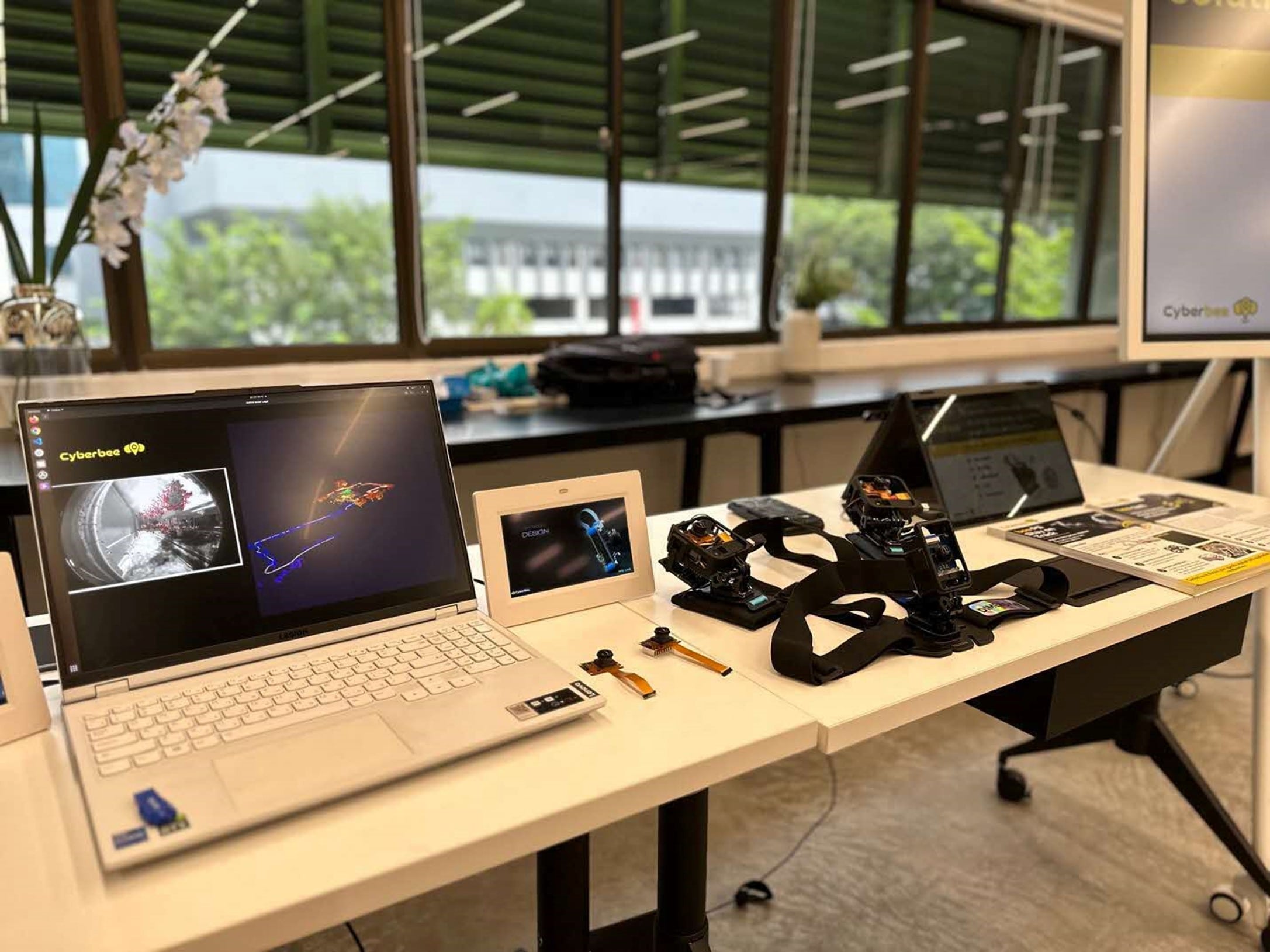 Cyberbee’s compact and cost-effective computer vision prototype has custom algorithms for mapping, localisation, and navigation in complex environments such as disaster zones that do not have GPS coverage. (Photo: HTX)
Cyberbee’s compact and cost-effective computer vision prototype has custom algorithms for mapping, localisation, and navigation in complex environments such as disaster zones that do not have GPS coverage. (Photo: HTX)
Dr Saravana Kumar, the Deputy Director (Modelling & Simulation) of Human Factors & Simulation CoE, described Cyberbee’s prototype as “a game-changer which not only enables blue force tracking but also serves as a lifesaving technology for the rapid evacuation of Home Team officers such as firefighters who are incapacitated, by triangulating their location in GPS-denied indoor environments.”
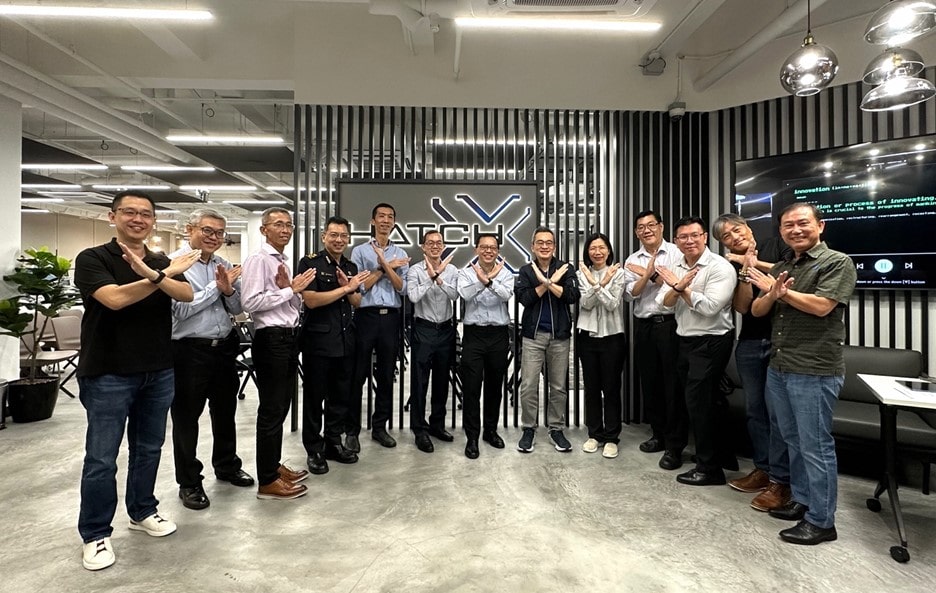 The Home Team leaders who attended Demo Day included the Home Team Academy’s Chief Executive Anwar Abdullah (third from left), ICA Commissioner Marvin Sim (fifth from left), the Chairman of HTX Board of Directors Aubeck Kam Tse Tsuen (middle); HTX Chief Executive Chan Tsan (sixth from right); and the Commissioner of the Singapore Prison Service Shie Yong Lee (fifth from right) (Photo: HTX)
The Home Team leaders who attended Demo Day included the Home Team Academy’s Chief Executive Anwar Abdullah (third from left), ICA Commissioner Marvin Sim (fifth from left), the Chairman of HTX Board of Directors Aubeck Kam Tse Tsuen (middle); HTX Chief Executive Chan Tsan (sixth from right); and the Commissioner of the Singapore Prison Service Shie Yong Lee (fifth from right) (Photo: HTX)
The startups which showcased their innovations at Demo Day on 24 January 2024 were the finalists from the initial cohort of 60 which joined Hatch’s inaugural Open Innovation Challenge. These finalists have spent the past year building their customised solutions for the Home Team departments, and will now wait to see if the Home Team departments choose to proceed with the further development of their prototype solutions for operational deployment.

